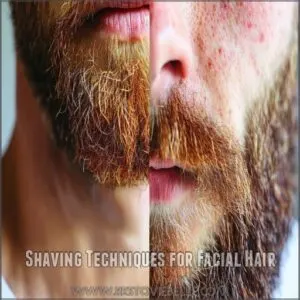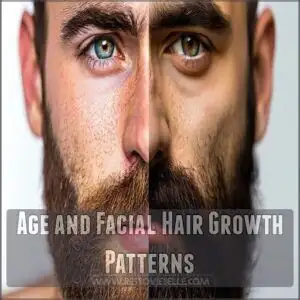This site is supported by our readers. We may earn a commission, at no cost to you, if you purchase through links.
 Ever wonder why your facial hair grows so fast?
Ever wonder why your facial hair grows so fast?
Blame it on genetics, hormones, and even a dash of luck!
If your family tree is filled with grizzly folks, you’ve likely inherited some speedy follicles.
Testosterone and its buddy dihydrotestosterone (DHT) play a huge role, pushing hair growth into overdrive.
Remember those awkward teenage years?
They kickstarted this whole process.
And sure, age can slow things down a bit, but it seems you’ve hit the facial hair jackpot.
Curious about optimizing beard growth or taming that wild mane?
There’s more than meets the eye, so stick around for handy tips!
Table Of Contents
- Key Takeaways
- Factors Influencing Facial Hair Growth
- Why Your Facial Hair Grows So Fast
- Physical Characteristics Affecting Facial Hair
- Lifestyle Habits Impacting Beard Growth
- Optimal Beard Care for Healthy Growth
- Age and Facial Hair Growth Patterns
- Maintaining a Healthy Beard
- Frequently Asked Questions (FAQs)
- Why does my facial hair grow so fast?
- What causes increased facial hair in women?
- Does facial hair grow faster?
- What causes excessive facial hair growth?
- Why does my hair grow faster than my head?
- Why does facial hair grow in New places?
- How can I stop my facial hair from growing so fast?
- What does it mean if your facial hair grows fast?
- Why does hair grow faster on face?
- At what age does facial hair grow the fastest?
- Can stress affect my facial hair growth speed?
- What role does hydration play in beard growth?
- Are there medications that slow down facial hair growth?
- How does smoking influence facial hair development?
- Can pollution impact the rate of facial hair growth?
- Conclusion
Key Takeaways
- Your genetics and hormone sensitivity, particularly those influenced by testosterone levels, play a role in facial hair growth patterns, and a mix of genetics and hormone sensitivity, particularly testosterone and dihydrotestosterone, is why your facial hair grows quickly.
- Proper beard care, such as using lightweight oils for curly beards, can also contribute to overall facial hair health, and lifestyle choices like regular exercise, a balanced diet, ample sleep, and stress management can influence beard growth speed and health.
- Proper beard care, including exfoliating, moisturizing, and correct shaving techniques, keeps your beard healthy and strong.
- Age affects growth patterns, with puberty and peak testosterone in your early 30s leading to the fastest facial hair growth.
Factors Influencing Facial Hair Growth
Ever wonder why your beard seems to sprout overnight?
It turns out your genes and hormones are working behind the scenes, with testosterone playing the starring role in this unexpected facial drama.
Genetic Predisposition and Facial Hair
Ever notice how your facial hair seems to grow out of control?
Blame it on your family history!
Beard genetics handed down from your parents determine hair follicle density and those quirky ethnic beard patterns.
If Grandpa had a luxurious beard, you might inherit that growth, too.
Inherited beard growth is a fascinating tale written by your DNA!
Hormonal Impact on Beard Growth
Facial hair’s rapid growth might be your testosterone levels and thyroid hormones playing their game. Hair follicle sensitivity to DHT (dihydrotestosterone) is key too.
- Hormonal Boosts: Testosterone and DHT are the main growth drivers.
- Thyroid Influence: It can accelerate or slow down growth.
- Stress Impact: Can mess with levels, slowing down growth.
- Natural Variation: Everyone’s sensitivity differs.
Why Your Facial Hair Grows So Fast
Your facial hair seems to grow overnight because your hair follicles are especially responsive to hormones like testosterone.
It’s like your beard is in a race powered by the hormone dihydrotestosterone, driving faster growth that can make shaving feel like an endless task.
Sensitivity of Hair Follicles to Hormones
Feeling like your beard’s plotting its own takeover? It could be that your hair follicles are extra sensitive to hormonal changes, which can be influenced by factors such as high androgen sensitivity, leading to thicker and faster-growing facial hair, including chin hair, as seen in individuals with hormonal imbalances.
Androgen receptors in these follicles kick into high gear with even small shifts in testosterone levels.
If you’ve got hormonal imbalances or distinct hair growth cycles, this sensitivity means your facial hair might grow faster than your neighbor’s.
Role of Dihydrotestosterone in Hair Growth
You’re blessed with rapid facial hair growth, thanks to dihydrotestosterone, or DHT.
This hormone, a testosterone derivative, activates hair follicles, boosting your beard’s speed.
To manage DHT levels, consider using DHT blocking supplements.
But beware, it can also lead to hair loss on your scalp.
Balancing high DHT with inhibitors or blockers can help manage growth and hair health, putting control back in your hands.
Physical Characteristics Affecting Facial Hair
Your facial hair’s growth isn’t just about hormones; the shape and size of your hair follicles, along with how they’re oriented, play a big role—think of it like tiny, personalized runways for your beard hairs!
The texture of your hair, whether it’s straight, curly, or kinky, also impacts how quickly it seems to grow and can even lead to those pesky ingrown hairs.
Hair Follicle Shape and Size
Unraveling the mystery of your quickly sprouting beard often leads to hair follicle size and shape. Think of it this way:
- Follicle Size: Bigger follicles mean coarser hair.
- Shape: Flat follicles can lead to curls.
- Density: More follicles equal a fuller, faster-growing beard.
- Health: Well-nourished follicles are key for rapid growth.
Nurture your follicles, and your beard will flourish!
Hair Orientation and Growth Pattern
Ever wonder why your beard zigzags or forms quirky patterns? Hair orientation shapes its character.
If your follicles are tilted or angled, you might see your hair growing sideways.
Check this quick guide:
| Follicle Angle | Growth Pattern |
|---|---|
| Flat | Horizontal |
| Tilted | Diagonal |
| Upright | Vertical |
| Varied | Uneven Patterns |
So, every follicle’s angle crafts its unique growth direction!
Hair Texture and Ingrown Hairs
Your beard’s natural texture, which can be influenced by the shape of your hair follicles and may result in curly beard growth patterns, plays a big role in how your facial hair behaves.
Curly or coiled hair types often struggle with ingrown hairs, shaving techniques, and follicle health.
Imagine your beard hair curling back into the skin—ouch!
To dodge this, exfoliate regularly and hydrate with curly beard care products.
These steps promote smoother growth and happier skin.
Lifestyle Habits Impacting Beard Growth
Your lifestyle choices can seriously impact the rate of your beard growth, so it’s not just genetics at work here.
Regular exercise, a balanced diet, plenty of sleep, and managing stress can all play a role, making you wonder if that quick five o’clock shadow is because you’re secretly a superhero.
Exercise and Testosterone Levels
Think of exercise like the secret sauce for your beard.
Strength training doesn’t just give you muscles; it gives your testosterone levels a nice bump too.
This testosterone boost can result in faster facial hair growth.
It’s like your workout routine is double-tasking.
So, that extra bench press might be the secret to your speedy stubble.
Balanced Diet for Beard Growth
Exercise pumps up testosterone, but have you checked what’s on your plate?
A balanced diet fuels beard growth, too.
Think about these foods:
- Lean meats for protein to build hair.
- Leafy greens packed with iron to support hair health.
- Nuts and seeds offer healthy fats.
- Eggs supply zinc and vitamins for a fuller beard.
Eating right makes a difference!
Sleep and Testosterone Production
So, you’re eating right, fueling your beard growth.
But did you know sleep’s a secret weapon?
Your body makes testosterone mainly while you’re snoozing.
Aim for 7-9 hours of quality sleep; poor sleep quality, or sleep apnea, can tank your testosterone levels, impacting beard growth.
Think of sleep as the ultimate beard-boosting nutrient.
Getting enough sleep is key to growing a magnificent beard.
Stress and Its Effects on Facial Hair
Ever notice how stress can make your hair feel like it’s growing faster than weeds in a garden?
Stress doesn’t just mess with your hormones, it can actually speed up hair growth due to increased cortisol levels.
Managing stress through meditation or exercise can help regulate hormonal changes, keeping your beard health in check and preventing those unexpected growth spurts.
Optimal Beard Care for Healthy Growth
Taking care of your beard involves more than just letting it grow wild and free; it’s about embracing techniques like proper shaving, exfoliating, and using the right moisturizers to keep it healthy and happy.
With a little bit of effort, and the right conditioners, you’ll be on your way to a beard that’s not just fast-growing, but also soft and well-groomed.
Shaving Techniques for Facial Hair
Choosing how you shave can make a real difference in beard growth.
You might want to explore shaving with the grain to prevent razor burns.
If you’ve noticed pesky ingrown hairs, keep an eye on your technique.
Using the right razor and beard trimming techniques isn’t just smart; it’s like finding the remote on the first try—satisfying!
Exfoliating for Healthy Follicle Function
Feeling like your blade isn’t enough?
Giving your beard a clean slate helps more than shaving ever could.
Exfoliating clears clogged pores and invigorates those sleepy follicles, simplifying your grooming routine.
To take your exfoliating to the next level, try using a beard exfoliation brush as part of your routine.
Consider these benefits:
- Reduces ingrown hairs.
- Enhances beard growth.
- Improves skin health.
- Boosts hair texture.
- Keeps your face feeling refreshed.
Let your skin breathe and your beard thank you!
Leave-in Conditioners for Beard Care
Keeping your beard healthy doesn’t just stop at exfoliating.
A good leave-in conditioner is like a magic potion for your facial hair.
Using a best beard conditioner can make a significant difference in maintaining its health and appearance.
It softens those wild strands and keeps them tangle-free.
Look for ingredients like argan oil and shea butter.
These ingredients hydrate your beard and also give you that groomed look, enhancing beard health without hassle.
Moisturizing for Soft and Healthy Hair
Ever notice your beard feels like straw? Moisturizing it can make a world of difference! Here’s how:
- Beard oil benefits: Use oils like jojoba for a smooth, shiny beard.
- Using a beard moisturizer with natural ingredients like coconut oil or sweet almond oil can help promote facial hair growth and overall beard health. Natural beard moisturizers: Aloe vera works wonders for hydration.
- DIY beard balm: Create your own balm with coconut oil and shea butter.
A soft beard feels and looks great!
Age and Facial Hair Growth Patterns
Your facial hair growth journey isn’t just about genetics; it’s also a wild ride influenced by your age and fluctuating hormone levels.
We’ll explore how those hormonal changes, especially testosterone, affect your beard’s growth rate from puberty to your later years, so you can understand why your face seems to sprout whiskers faster than a Chia Pet!
Puberty and Initial Beard Growth
Once you’ve got your beard care routine, you finally get to welcome puberty, where things start shaking up with hormonal changes.
As you navigate these puberty stages, you’ll notice hair follicle development kicking in, shaping your personal beard growth timeline.
Embrace those facial hair variations as they reflect your unique journey, adding a touch of individuality to your style.
Peak Testosterone Levels and Facial Hair
Your facial hair often grows faster thanks to peak testosterone levels during your early thirties. As you’ve noticed, this steroid hormone plays a big role in how speedily those whiskers sprout!
- Exercise regularly to temporarily boost testosterone.
- Eat a balanced diet to support overall health.
- Get quality sleep for hormone production.
- Manage stress to maintain healthy hormone levels.
Aging Effects on Facial Hair Growth
You might notice changes in beard growth as you age due to testosterone decline and hair follicle changes.
While you enjoyed a face full of dense hair in your 20s, aging effects can slow that down.
| Age Range | Testosterone Levels | Facial Hair Density |
|---|---|---|
| 20s | Highest | Thickest |
| 30s-40s | Stable | Reduced |
| 50+ | Lower | Sparse |
Your facial hair’s pattern may seem as moody as a teenager during this time!
Maintaining a Healthy Beard
Keeping your beard looking sharp isn’t just about style; it’s a science.
With the right care, you can avoid pesky issues like ingrown hairs and itchiness.
Making your beard as impressive as your favorite superhero’s.
Avoiding Ingrown Hairs and Breakage
Maintaining a thick beard might be stylish, but dealing with ingrown hairs and breakage can feel like dodging landmines.
Shaving techniques matter—always go with the grain to minimize friction.
Exfoliation can help too, sloughing off dead skin.
Beard products like oils and balms keep hair texture soft and skin care in check, making you look effortlessly polished.
Preventing Beard Dandruff and Itchiness
Battling beard dandruff and itchiness?
Start by keeping your beard and scalp healthy with a regular beard wash routine, which can be easily maintained with the right beard wash products online.
Using quality beard care products, like beard oils, provides benefits such as moisture and relief from itchiness.
Consider natural remedies like tea tree oil to soothe irritation.
Remember, a clean beard is a happy beard—free from flakes and discomfort!
Enhancing Beard Appearance With Care
So, you’ve conquered dandruff and itchiness? Great! Now let’s talk about making your beard look its best.
Regular beard oil benefits are huge—it softens, conditions, and even smells amazing. This is largely due to its ability to nourish hair follicles and promote healthy growth, while also softening, conditioning, and even smelling amazing.
To achieve a perfect look, consider learning how to maintain a short beard, including choosing the right tools and trimming techniques for your face shape maintaining a short beard.
Experiment with beard styling products to find your perfect look.
Mastering beard trimming techniques takes practice, but it’s worth it for a sharp, clean style.
A consistent beard care routine will keep your beard healthy and handsome.
Frequently Asked Questions (FAQs)
Why does my facial hair grow so fast?
Your rapid facial hair growth likely comes down to a combo of genetics and high testosterone sensitivity.
Blame your DNA for those quick-growing whiskers, as well as the hormones that decide how fast your facial fuzz emerges.
What causes increased facial hair in women?
Imagine this: hormones and genetics tag-team to boost facial hair in women!
Polycystic ovary syndrome (PCOS), adrenal gland disorders, and excess androgens often play lead roles.
Don’t worry, doctors can guide you through balancing these factors.
Does facial hair grow faster?
Facial hair growth speed mainly hinges on genetics and testosterone.
Some folks are just more predisposed to faster growth due to their genetic makeup and how their body processes testosterone.
Proper diet and lifestyle can also play roles.
What causes excessive facial hair growth?
Excessive facial hair growth, or hirsutism, often results from hormonal imbalances, particularly elevated androgens like testosterone.
Genetics play a big role too.
Conditions like polycystic ovary syndrome (PCOS) can contribute, needing professional medical advice for management.
Why does my hair grow faster than my head?
It’s all about your genes, buddy! Hair follicles on your face might simply be genetically programmed to grow quicker than those on your head. Everyone’s different!
Why does facial hair grow in New places?
Picture your face as a garden—the roots of hair aren’t bound by strict borders.
New sprouts can pop up due to genetic shifts, hormonal changes, or increased sensitivity of hair follicles, revealing new growth territories.
How can I stop my facial hair from growing so fast?
Balance facial hair growth by managing testosterone levels: exercise regularly, eat a nutritious diet, and get enough sleep.
Stress reduction helps too.
If needed, consult a doctor about hormonal therapies to slow growth.
Regular grooming keeps it enjoyable.
What does it mean if your facial hair grows fast?
Fast facial follicles flourishing often means genetics and testosterone are teaming up.
You might’ve inherited this rapid growth rate from family, or your body’s testosterone levels are higher, fueling faster facial fuzz development.
It’s nature’s beard boost!
Why does hair grow faster on face?
Facial hair grows faster due to certain nutrients like vitamin D which regulates testosterone levels, allowing the skin to synthesize it through sunlight exposure. Facial hair grows faster due to genetics and hormone sensitivity, especially to testosterone.
Ethnicity and lifestyle factors like diet and exercise also play a role.
It’s a unique blend of biology, heritage, and personal habits.
At what age does facial hair grow the fastest?
Think of adolescence as a mysterious transformation: during late teens to early 20s, testosterone surges, fueling rapid facial hair growth.
It’s like watching a beard blossom overnight—suddenly, you’re managing a full-grown look.
Can stress affect my facial hair growth speed?
Stress can mess with your hair growth by influencing hormone levels.
When you’re stressed, cortisol rises, potentially lowering testosterone, which may slow down facial hair growth.
So, manage stress for both a calmer mind and a healthier beard!
What role does hydration play in beard growth?
Proper hydration is essential for overall health, including beard growth. Think of your hair follicles like thirsty plants—they need water to thrive! Dehydration can stunt growth, so drink up!
Are there medications that slow down facial hair growth?
Imagine life’s fast-forward button stuck on your razor’s edge.
Medications like anti-androgens or certain birth control pills can slow facial hair growth by reducing hormone levels.
Always chat with your doctor first to explore safe options.
How does smoking influence facial hair development?
Smoking can hinder facial hair growth by reducing blood flow and vitamin absorption, impacting hair follicle health.
It’s like depriving your beard of essential nutrients, slowing down growth and potentially leading to thinner, weaker hair.
Can pollution impact the rate of facial hair growth?
Pollution can affect your skin health, potentially impacting facial hair growth.
Pollutants might clog pores or irritate skin, affecting follicle function.
Regular cleansing can help maintain healthy follicles, supporting good hair growth despite environmental challenges.
Conclusion
So, if you’re often asking, "Why does my facial hair grow so fast?" you’re not alone.
Your genetics, hormone levels, and lifestyle choices all play into this speedy growth.
Embrace it!
Consider optimizing your beard care routine—incorporate balanced nutrition, regular exercise, and effective grooming techniques.
These strategies help manage the growth but also improve your beard’s health and appearance.
Though it may feel like a hairy challenge, embracing these tips can help you enjoy the ride.

















